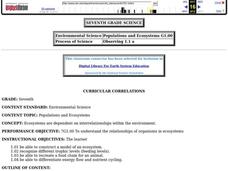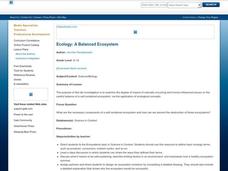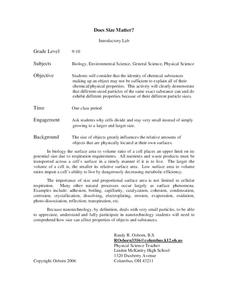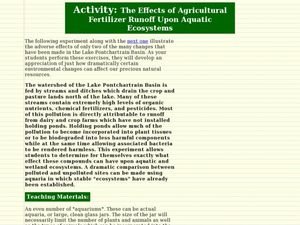Curated OER
Does Your Diet Stack Up?
Students investigate the food pyramid. In this nutrition lesson, students review the food pyramid and construct a list of what they eat. Students review the nutritional value of their food list and brainstorm ways to improve their diet.
Curated OER
Plant and Animal Cells - Are they Different?
Students observe the similarities and differences between plant and animal cells. In this cell activity, students use microscopes to observe self prepared slides of animal and plant cells.
Curated OER
The Future of Arctic Sea Ice
Students research about the importance of sea ice to world climate and sea organisms. In this earth science lesson, students create a model of present and future Arctic sea ice communities. They discuss how ice melting affects...
Curated OER
Plant Transpiration
Students conduct various experiments to investigate plant transpiration. In this biology lesson, students explain how this process helps maintain the hydrologic cycle. They measure the rate of water loss in plants using a potometer.
Curated OER
Finding Fungi in the World Around Us
These lesson ideas will help your students explore the diversity of Kingdom Fungi.
Curated OER
Populations and Ecosystems
Seventh graders create a model of an ecosystem and label it to show structure and function. They research the food web of an aquatic animal and also trace energy flow from the primary producer up the food chain.
Curated OER
Food Chains Are Not A Necklace!
Second graders examine how food chains interact with different plants and animals. They practice using new vocabulary. They also discover the role of pesticides in the environment.
Curated OER
Fighting Hunger
Students participate in a service-learning project to help combat hunger in their community. In this current events lesson, students discuss possible causes for hunger in the United States. Students read a short story, conduct online...
Curated OER
Circles in the Landscape: Irrigating Oklahoma Crops
How do you grow crops in a area with insufficient rainfall? Why you irrigate, of course. Class members investigate irrigation systems by designing a system of their own. After examining irrigation related concepts, vocabulary terms, and...
Curated OER
Fighting Hunger
Eighth graders investigate domestic hunger. In this Current Events lesson, 8th graders read and discuss "The Fighting Mynahs". Students conduct online research for a specific topic.
Curated OER
Ecology
Pupils gain an understanding of necessary components required within a healthy, sustainable environment and ways human actions can impact that balance while discovering how to recognize and analyze explanations and models used in...
Curated OER
Not Only a Drought
Pupils explore the events that occurred during the Dust Bowl and differentiate between the good and bad agricultural practices. For this Dust Bowl lesson students participate in activities that shows them how to be good stewards of the...
Curated OER
Can You "Gas" What's Happening?
Students examine gas production in "soil" samples through hands on activities and class discussions, to determine if the soil samples have contain living or non-living systems.
Curated OER
Does Size Matter?
Young scholars explore the surface area to volume ratio in cellular respiration. While participating in an interactive lab experiment, they examine proportional surface area and discuss nanotechnology. Students observe the...
Curated OER
Building a Pyramid
Fifth graders, in groups, research and create a poster or brochure examining the new food pyramid. They create a one-day menu that satisfies the requirements.
Curated OER
Plants 'R' Us!
Students investigate the interdependencies of plants and animals, and study what a food web is. They create a food web using yarn and images.
Curated OER
Web of Life
Young scholars collect information about various organisms in a forest ecosystem and create a mural that depicts organism interdependence. They then simulate a food web using a ball of string.
Curated OER
Forest Food Web
Students explore the elements of a forest ecosystem. They examine the elements needed to form a forest food web. Students construct and describe food webs that include nonliving elements of the ecosystem.
Curated OER
Cellular Transport and the Cell Cycle
With a multitude of questions, this worksheet offers students the opportunity to review their knowledge about the cell cycle. Question types include true/false, word bank, and completing a table about the differences between interphase...
Curated OER
Nutrition Awareness
Students gain an awareness of nutrition. In this science lesson plan, students explore how to determine his or her ideal body weight, demonstrate familiarity with the food groups relating to kilocaloric content, estimate the basic...
Curated OER
The Effects of Agricultural Fertilizer Runoff Upon Aquatic Ecosystems
Students measure the toxic levels of runoff and discuss the effects it would have on the aquatic system. For this runoff lesson plan, students answer questions to how runoff would affect the animals in an aquatic system.
Curated OER
Jr. Chef Club Delightful Desserts
Students identify the fat content in foods. In this nutrition lesson, students review the food pyramid and identify foods that are low in fat. Students create a low-fat dessert by using fruit.
Curated OER
Why is Rice Good for Us?
Third graders explore why rice is good for our bodies. For this nourishment lesson, 3rd graders review the food pyramid and discuss serving sizes. Students discuss the different ways rice is used in food. Students use uncooked rice to...
Curated OER
Primary Producers
Students examine the role of carbon in the oceans and how phytoplankton determine the levels present. In groups, they practice measuring primary productivity using two methods. They use the internet to research the role of phytoplankton...

























